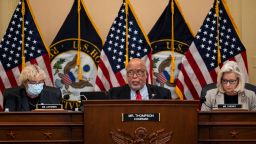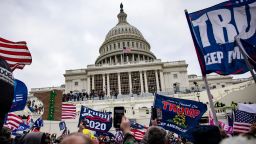Michael Flynn has swiftly lost his bid in court to block a possible House select committee subpoena for his phone records and to hold off demands he speak to the panel investigating January 6.
The ruling Wednesday comes one day after he asked a federal judge in Florida for a temporary restraining order, and it’s the first quick response to a lawsuit from a House witness, after several went to court to try to invalidate the committee and block the House from pursuing their phone records.
So far, 11 others for whom the committee subpoenaed phone records have sued. Overall, the House has already spoken to dozens of witnesses and requested more than 100 people’s phone records.
While the lawsuits to challenge the House are gaining attention, they’ve revealed that the committee appears to be notching many successful interviews about the pro-Trump rally and its high-profile right-wing participants and the insurrection on January 6, and that they are likely to have received large amounts of call log data from Verizon and AT&T already.
Flynn went to court on Tuesday, just a day after he was scheduled to testify before the committee – in what appeared to be an attempt to hold off the consequence of his failure to appear, as well as any other fact-finding by the panel.
District Judge Mary Scriven in Tampa said in the decision that Flynn did not meet the procedural requirements to make the case for emergency intervention, and that he could refile his request in the future or allow his requests to play out on a longer schedule in court.
Flynn had sought help from the judge by Thursday.
At this time, the dates were unclear as to when Flynn needed to turn over documents to the committee and appear for a deposition, the judge noted, and it wasn’t known if his phone records had actually been subpoenaed.
Flynn, in his complaint, had told the judge he was initially in talks with the committee and was beginning to preserve and collect documents he had to share with them. The committee agreed to delay his deposition, setting it for Monday.
But Scriven noted the document deadline passed weeks ago, in November, and that the committee was planning to push back the deposition again to “a date to be determined.”
The judge said Flynn hasn’t provided in court other relevant evidence about his communications with the committee.
“Flynn has not, however, provided any information about the date by which the Select Committee currently expects him to produce documents,” the judge wrote. “Thus, on this record, there is no basis to conclude that Flynn will face ‘immediate and irreparable’ harm before Defendants have an opportunity to respond,” Scriven added.
An attorney for Flynn, David Warrington, said in a statement following the ruling that “the Court acknowledged that should the Select Committee take actions that would cause an immediate harm to General Flynn, such as expediting the response dates for document requests from Flynn or for the phone company subpoenas, a renewed motion for TRO may be appropriate,” referring to a temporary restraining order.
“General Flynn looks forward to obtaining relief from Congress’s unconstitutional and unlawful investigation in the normal course of his pending suit for injunctive relief that was not affected by today’(s) order,” he added.
Flynn said he told the committee he planned to assert his Fifth Amendment right against self-incrimination, and was going to court instead of appearing in person before them. In the lawsuit, he outlines how his failure to appear for testimony may be a sticking point with the committee – believing it could lead the House to vote to hold him in contempt.
Flynn has long faced tribulations in court since he lied in 2017 to the FBI and Vice President Mike Pence while serving as national security adviser in the Trump White House. He lost his job over the episode and pleaded guilty in federal court to making false statements. But he was pardoned by Trump near the end of the administration, and became a public voice in right-wing circles touting a disproven belief that Trump lost the election because of widespread voter fraud.
This story has been updated with additional details Wednesday.
CNN’s Tierney Sneed contributed to this report.






















